Key takeaways:
- Informed consent in DNA testing is essential for personal autonomy and understanding how genetic data may be used or shared.
- Emotional preparedness is crucial, as individuals may face unexpected discoveries that can impact their well-being and family dynamics.
- Advocacy strategies, like community workshops and collaboration with ethical bodies, can improve transparency and enhance the informed consent process.
- Future improvements should focus on tailored educational materials and regular follow-up communications to support informed decision-making.
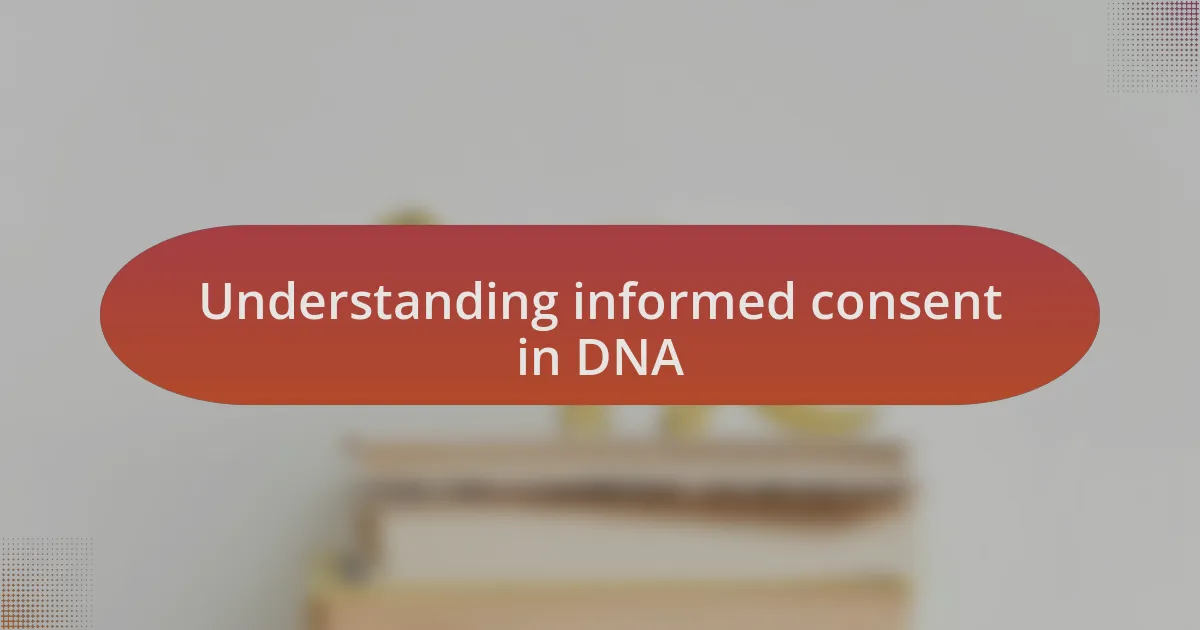
Understanding informed consent in DNA
Informed consent in DNA testing is not just a protocol—it’s a fundamental ethical pillar that ensures individuals understand how their genetic data will be used. Reflecting on my own experience, I recall the initial thrill of discovering my ancestry through DNA testing; however, that excitement quickly morphed into unease as I grappled with the implications of sharing my genetic information. What happens to our data once it’s in someone else’s hands?
Understanding informed consent also means recognizing the practical complexities involved. I remember the moment I read the lengthy consent form and felt overwhelmed. It made me question if I truly understood whether my data might be used for research or sold to third parties. Have you ever signed something without fully knowing what you were agreeing to? This disconnect can leave individuals vulnerable, underscoring the importance of clear, transparent communication from testing companies.
Moreover, informed consent isn’t just about legal jargon; it’s about emotional responsibility. When I finally spoke to others who had undergone genetic testing, their stories often revealed fear of unwanted discoveries, like learning about a hereditary condition. How can we foster a culture where informed consent is not just a checkbox, but a genuine dialogue about the weight of our genetic identities? These are the conversations we should strive to have.
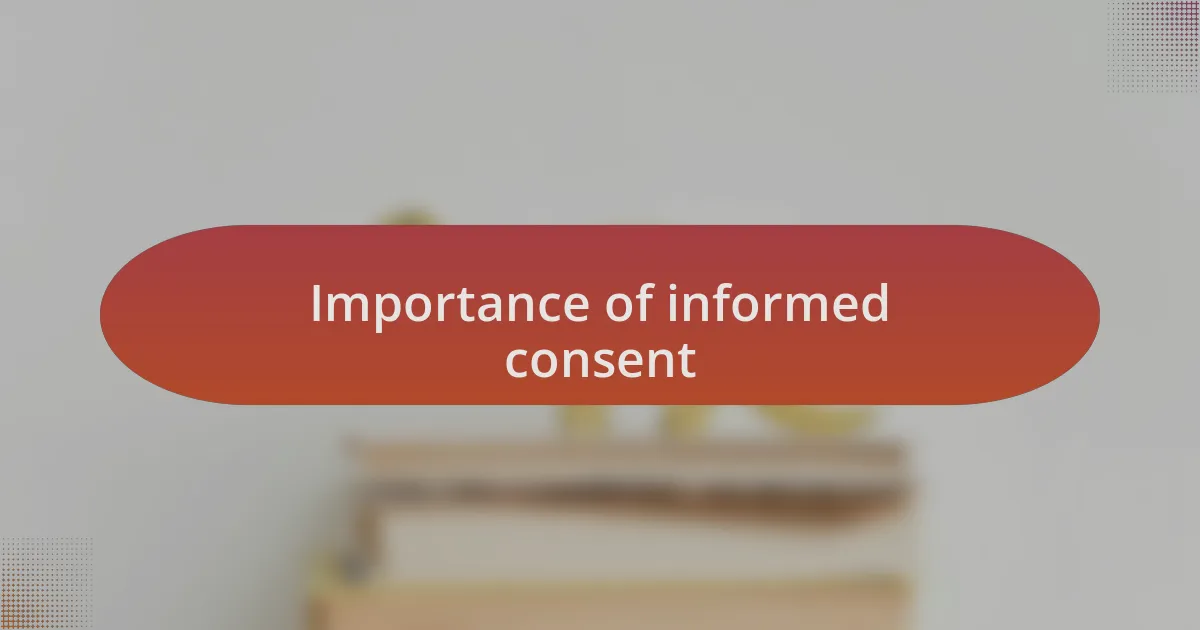
Importance of informed consent
Understanding the importance of informed consent goes beyond legal obligations; it touches the very essence of personal autonomy. I distinctly remember a friend who declined to take a DNA test after realizing the potential for her data to be used in unforeseen ways. Her decision resonated with me—how vital it is for individuals to feel in control of their genetic information and make choices that align with their values and comfort levels. Don’t you think everyone should have that right?
Another angle that often strikes me is the emotional weight of informed consent. I once attended a seminar where a genetic counselor spoke about the potential emotional ramifications of learning unexpected truths from DNA results. It made me reflect on how different people might react—some with curiosity and others with fear or anxiety. Isn’t it critical that testing companies not only inform users about what to expect but also prepare them for the emotional journey that may follow?
The narratives shared by those who felt unprepared highlight a crucial oversight in how informed consent is often framed. I recall hearing someone express regret about a missed opportunity to discuss the implications of genetic testing with their family beforehand. This makes me question: can we do better in facilitating conversations around consent? Ensuring that people understand the implications of sharing their genetic information is essential for fostering an environment of trust and support.
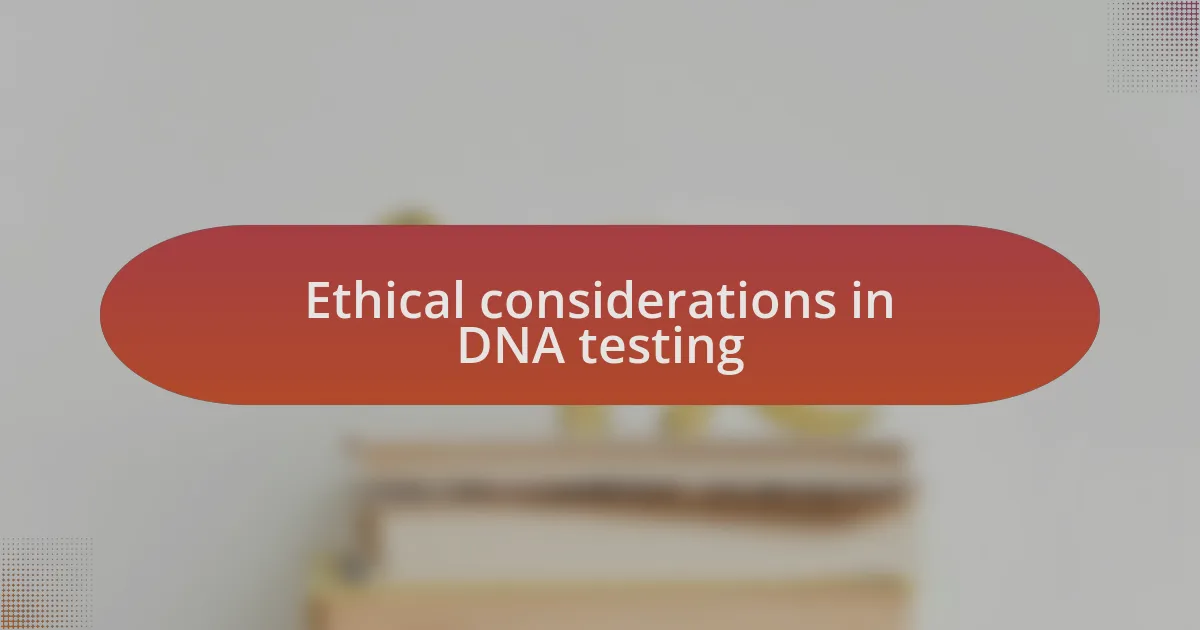
Ethical considerations in DNA testing
Ethical considerations in DNA testing extend into the realm of privacy and ownership. I remember a discussion I had with a family member who expressed discomfort about what companies might do with their DNA data. It struck me—if individuals aren’t fully aware of how their genetic information can be utilized or shared, how can they truly consent to testing? This makes me wonder: should genetic testing companies be more transparent about their data policies?
Another significant aspect is the potential for discrimination based on genetic information. I once read a story about a person who was denied employment opportunities simply due to a genetic predisposition revealed in testing. This unsettling reality raises important questions about how we safeguard against misuse of genetic data. Are there enough protections in place to ensure that individuals aren’t unfairly judged based on their DNA?
Finally, it’s essential to consider the implications for family members whose DNA may also be affected by one person’s decision to test. I recall meeting someone who discovered sensitive health information through a DNA test—only to realize that they had inadvertently uncovered implications for their siblings and parents as well. This situation highlights a vital point: informed consent is not just a personal matter; it can ripple through entire family dynamics. How do we address these interconnected relationships in the context of DNA testing?
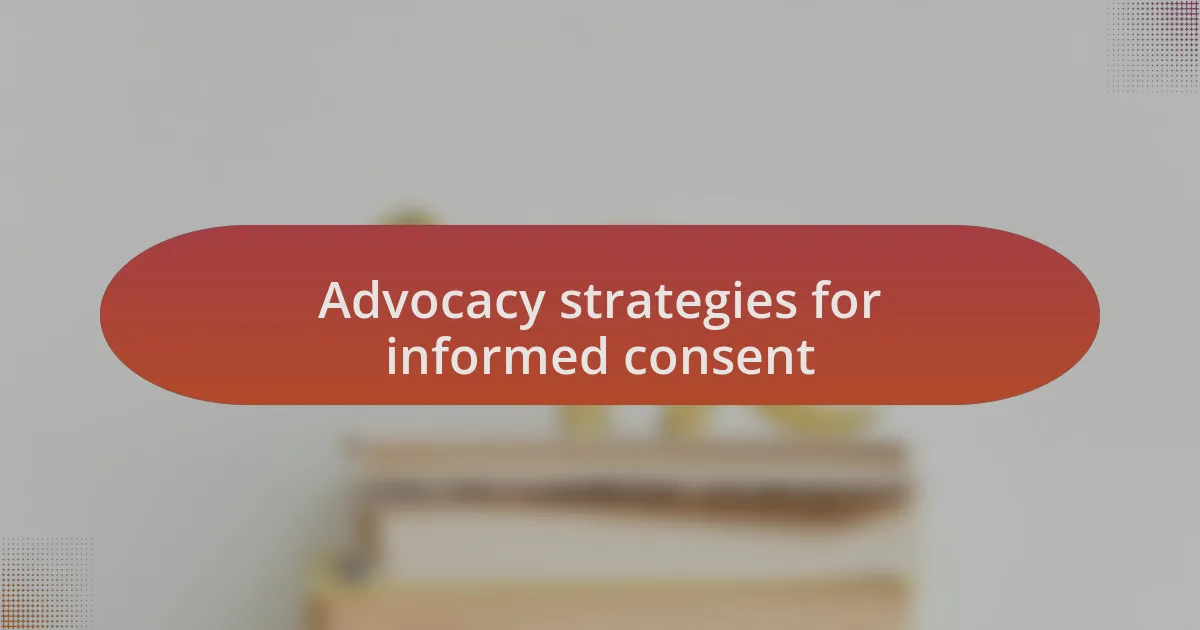
Advocacy strategies for informed consent
One effective advocacy strategy I’ve found is to promote community workshops focused on demystifying DNA testing. I recall organizing a session in my local area where we invited a genetic counselor to explain the nuances of informed consent. Participants seemed grateful to have an expert navigate the complexities of data use and privacy, and it was eye-opening to see how many misconceptions were cleared up in just one evening. How often do we talk about these issues in our communities?
Another approach I’ve taken is leveraging social media platforms to amplify the message of informed consent. I remember sharing a compelling story of a friend whose DNA results unexpectedly impacted their family’s health decisions. The response was overwhelming, with many people expressing their own concerns and experiences. This taught me that personal narratives resonate deeply and can ignite conversations about the importance of informed consent in genetic testing.
Additionally, collaborating with ethical oversight bodies has proven fruitful in advocating for better practices. I’ve participated in meetings where we pushed for guidelines that require clear communication from testing companies about consent processes. It was inspiring to witness how a collective voice could influence policy changes, but it also made me question: are we doing enough to hold these companies accountable? The ongoing dialogue remains crucial in supporting individuals’ rights to informed consent in DNA testing.
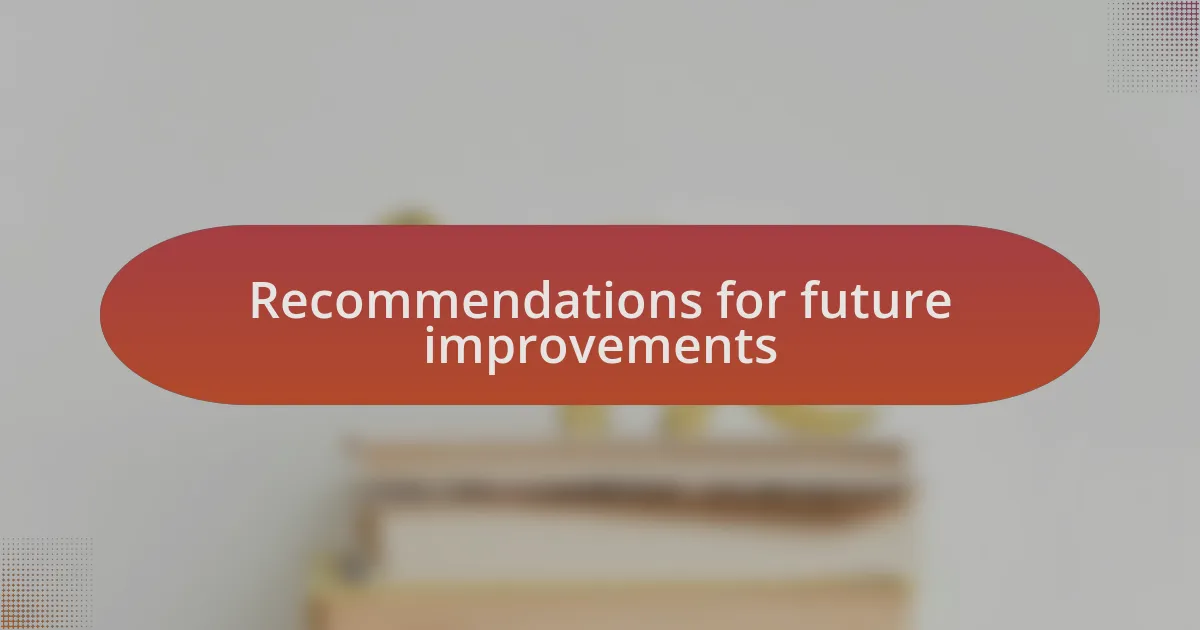
Recommendations for future improvements
One important recommendation for future improvements in informed consent is the development of comprehensive educational materials tailored to various demographics. I once spoke with a group of seniors who expressed confusion over how their DNA data could be used. It struck me that many companies fail to provide information in a manner that resonates with different age groups, ultimately leaving them vulnerable. How can we expect informed decision-making if the material is not accessible?
Moreover, fostering partnerships between genetic testing companies and consumer advocacy groups could enhance transparency. In a past initiative, I saw firsthand how working with consumer advocates helped a testing company refine their consent form, making it more user-friendly and less filled with jargon. Isn’t it time we emphasize the collaboration between these entities to prioritize the consumer’s understanding and rights?
Finally, I believe that regular follow-up communications from testing companies post-testing could significantly improve the informed consent process. Personally, I remember feeling abandoned after I received my results, with no guidance on what to do next. If companies took the initiative to check in with users about their understanding of the results and any related legal or medical questions, would it not empower them to make more informed choices? This approach could build trust and enhance user experience in the long run.